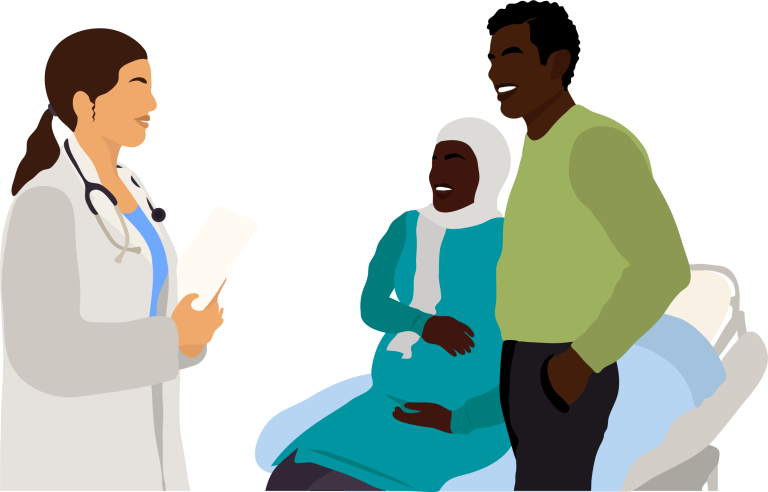
While it appears adults with underlying medical conditions, including asthma and diabetes, appear to be at higher risk for severe coronavirus disease, as an expecting parent you may be wondering how does this virus affect pregnant women and their unborn babies.
Get the answers to commonly asked questions that expectant parents have about COVID-19.
The COVID-19 outbreak has caused a lot of stress and worry for all parents – expecting or new. The Mother Baby Center wants to be a resource for you to get all of your questions answered.
COVID-19, also known as coronavirus, is a respiratory illness that can spread from person to person.
Symptoms of COVID-19 can range from mild to severe, and can include:
If you think you have symptoms of COVID-19, please call your pregnancy care provider or primary care provider. Your provider will review your symptoms over the phone then recommend next steps: Staying home, going to a testing site or clinic for evaluation, or going to the emergency department.
If you have severe shortness of breath and need to see a health care provider, please call ahead then have someone drive you to the nearest clinic or emergency department.
Yes; however, early data suggests that most pregnant people with COVID-19 do not become sicker than non-pregnant people with the illness. Because this is a new virus, health care providers are not yet certain that this is true for all cases.
We do know that pregnant people are more susceptible to other viral respiratory infections, such as influenza (the flu), the CDC predicts that pregnant people may experience more severe COVID-19 symptoms than the general population.
Go here for information on COVID-19 vaccination during pregnancy.
As with the flu or any other virus, the best ways to help protect yourself from COVID-19 are to follow these simple steps:
Because this is a new virus, there is not a lot of research on how COVID-19 might affect an unborn baby. At this time, it is unknown if a pregnant person with COVID-19 can pass the virus to the baby during pregnancy or delivery. However, research has not found the virus in amniotic fluid or breastmilk.
A baby is more likely to get COVID-19 after delivery if they come in contact with respiratory droplets from their parent or another person with COVID-19.
According to the CDC, high fevers during the first trimester of pregnancy can increase the risk of certain birth defects. Catching other viral respiratory infections, including the flu, during pregnancy is linked to preterm labor and low birth weight.
To provide the safest environment for expectant parents, babies, visitors, and our staff, we have updated our support person guidelines to help expectant parents know what to expect during their labor and delivery. View visitor guidelines.
Your care provider will review all necessary labor precautions with you in the last month of your pregnancy.
Hospital births provide the reassurance that emergent care is immediately available if you or your baby need additional care. Home births can have increased risks as the response to urgent needs, such as medical or surgical emergencies or resuscitation of your baby, can be delayed.
If you have COVID-19 or symptoms of COVID-19, you will be asked to put on a mask when you arrive at the hospital, and you will be cared for in a private room. Your health care team will also wear protective equipment.
COVID-19 will not change how you deliver your baby. Most women can have a vaginal birth, but a Cesarean birth can happen with any pregnancy. If you are planning to have a vaginal birth and you have a cough, you will be asked to wear a mask as much as you are able.
If you do not have symptoms of COVID-19, you will not be separated from your baby. If you do test positive for COVID-19 or have symptoms consistent with the illness, the AAP (American Academy of Pediatrics) recommends that mothers wear a mask and use hand hygiene when caring for or feeding her baby. You and your newborn may room together, as usual practice, as evidence suggests rooming in does not increase the likelihood for your baby to acquire infection from you. However, if you are experiencing moderate to severe symptoms, and are unable to care for the newborn, separate rooms may be needed.
If your baby has a separate room from you:
If you have any questions, please talk with your health care team. This can be a difficult time, but your health care team is working hard to help reduce your baby’s exposure to COVID-19 while caring for you and your baby.
Hospital team members take every precaution to protect you and your baby from getting an infection while you are in our care. For this reason, you will see our staff wearing masks while they care for you and your baby. They will also wear gowns and gloves for more invasive procedures, such as delivery. Wearing protective equipment helps to protect you, your family and our staff members from COVID-19.